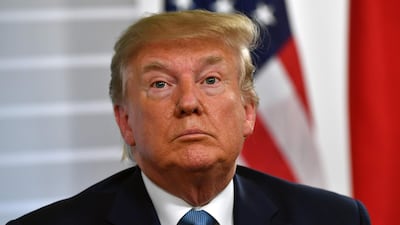Oil markets are set for further uncertainty this week after US President Donald Trump said at the G7 summit in France that he’s had “second thoughts” about escalating his country’s trade war with China, before clarifying that he wished to increase tariffs further.
"Yeah, sure, why not?” the US President responded to questions on whether he had “any second thoughts” on increasing confrontation with China, after he slapped a further 5 per cent tariff on Chinese goods over the weekend, as Beijing responded to his earlier escalation with higher taxes of their own on US goods.
When pressed again, Mr Trump said, "Might as well, might as well. ... I have second thoughts about everything,” he told reporters during a meeting with UK Prime Minister Boris Johnson.
The White House later said his comments were "greatly misinterpreted", saying Mr Trump's real regret was not raising tariffs higher.
The mood swings in policy from the White House towards China will offer little comfort to commodities, particularly oil, which has been moved primarily by Mr Trump’s pronouncements on trade. On Friday, Brent declined to $58.30 per barrel - its steepest in a single-day this month - before recovering to finish at $59.92 after China retaliated against US tariffs announced earlier this month, by revealing taxes on $75 billion (Dh275.43bn) worth of US goods. The taxes will range from 5 to 10 per cent and will be enforced in two phases from September 1 as well as December 15, coinciding with US tariff imposition dates.
Beijing also announced the resumption of a 25 per cent tax on US vehicles and a 5 per cent tax on auto parts and components, which are set to begin on December 15. China had frozen the auto taxes in April.
In a tweet, Mr Trump reacted to Beijing’s moves by increasing taxes he had proposed at the beginning of the month by 5 per cent.
"China should not have put new Tariffs on 75 BILLION DOLLARS of United States product (politically motivated!). Starting on October 1st, the 250 BILLION DOLLARS of goods and products from China, currently being taxed at 25%, will be taxed at 30%…,” he tweeted on Friday.
"...Additionally, the remaining 300 BILLION DOLLARS of goods and products from China, that was being taxed from September 1st at 10%, will now be taxed at 15%. Thank you for your attention to this matter!” he added.
The escalation caused a rout in global stocks and commodities, with the West Texas Intermediate benchmark, which tracks largely North American crude grades, particularly hit as China included imports of US oil in its latest round of tariffs.
WTI lost 3.8 per cent of its value on Friday, with prices plunging to the lowest so far this month at $53.24, before closing at $54.17 per barrel.
The benchmark is expected to continue to be impacted by the escalation as the US, the world’s largest crude producer directs 6 per cent of its output to China, according to Department of Energy statistics.
The American Petroleum Institute denounced the latest escalation in the trade war between the US and China, warning that the consequences will be felt by American businesses and families.
“We urge the administration to quickly come to a trade agreement with China that would lift all tariffs under Section 301, including the damaging retaliatory tariffs on American energy exports,” API’s Kyle Isakower, vice president of regulatory and economic policy said in a statement.


